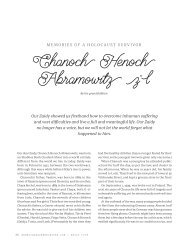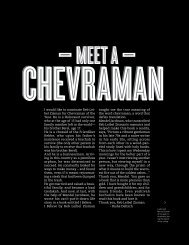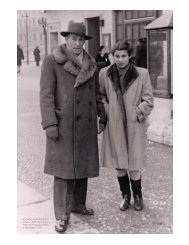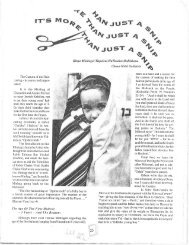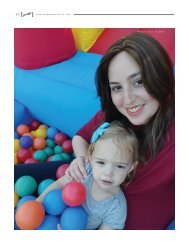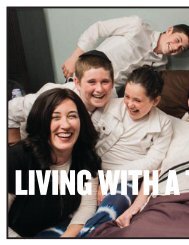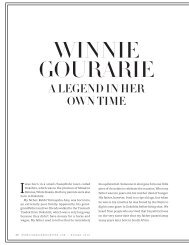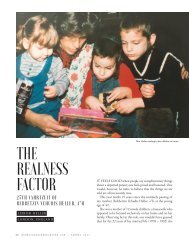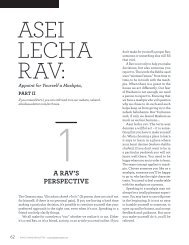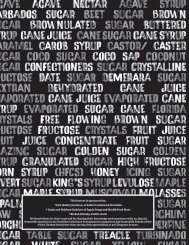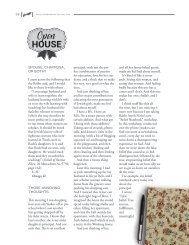Create successful ePaper yourself
Turn your PDF publications into a flip-book with our unique Google optimized e-Paper software.
GUEST EDITORIAL<br />
TURNING OUR BACKS<br />
RABBI ELI FRIEDMAN<br />
Chabad of Calabasas, CA.<br />
I WISH I COULD HAVE MET REBBETZIN Chana.<br />
She was the Rebbe’s mother and she lived in the<br />
apartment building next door to my father’s<br />
childhood home.<br />
By all reports, the Rebbetzin was a regal, softspoken<br />
woman, brilliant and kind—everything<br />
you might expect to find when you meet the<br />
mother of the Lubavitcher Rebbe. Her husband,<br />
the saintly Rabbi Levi Yitzchak Schneerson, the<br />
Rav of Yekaterinoslav for 30 years, was<br />
persecuted and exiled by the Communists<br />
until 1946 when he passed away in exile<br />
from starvation and deprivation.<br />
In 1947, the Rebbe flew from New<br />
York to Paris and collected his refugee<br />
mother and brought her to the United<br />
States. She moved into an apartment<br />
at 1414 President Street and, despite her<br />
profound grief (besides her husband’s<br />
passing, her son Dovber was murdered<br />
by the Nazis), she became a revered<br />
and beloved figure in the fledgling<br />
Lubavitcher community in Crown<br />
Heights.<br />
Her son visited her every day. Even<br />
when he became the Rebbe of Lubavitch<br />
in 1950, he continued to carve out time<br />
every day to walk to President Street<br />
and spend time with his mother. And<br />
as Lubavitch grew and the Rebbe’s<br />
responsibilities with it, the Rebbe never<br />
missed a day with his mother.<br />
My father remembers how he and<br />
his friends would drop their toys and<br />
run to open the door when they saw the Rebbe<br />
approaching. (And he remembers Rebbetzin<br />
Chana coming downstairs one day and asking<br />
them with a smile to please let the Rebbe open<br />
the heavy steel door himself because he needs<br />
the exercise.)<br />
Rebbetzin Chana told one of the chassidim:<br />
“When my son comes to visit me, after we spend<br />
some time together and he prepares to leave back<br />
TISHREI 2017 | NSHEICHABADNEWSLETTER.COM 1
to his office, I notice how he makes his way to the<br />
door in a peculiar way. As he goes, he straightens a<br />
chair here, rearranges something there, all on his<br />
way to the door. He does this in such a way so that<br />
without being obvious about it, he never shows<br />
me his back. He thinks I don’t notice, but I do.”<br />
REBBETZIN CHANA passed away on Shabbos<br />
Shuvah, the sixth day of Tishrei, in 1964. On the<br />
“Shabbos of Return,” she returned her soul to<br />
Heaven. Ever since then, she is celebrated and<br />
remembered at this time of the year, in the days<br />
between Rosh Hashanah and Yom Kippur.<br />
But while the Rebbetzin is a paradigm in her<br />
own right, the timing of her passing has its own<br />
meaning. What can we glean from her story to<br />
polish our own Shabbos Shuvah and Yom Kippur<br />
experiences?<br />
Here’s a thought.<br />
What is the significance of not showing your<br />
mother your back? Is there something terrible<br />
about the back?<br />
The sight of someone’s back means that<br />
they’re leaving. And no-one should ever leave<br />
their mother. It’s disrespectful. After everything<br />
a mother does for her baby, then her toddler,<br />
then her adolescent, then her teenager, then her<br />
adult child, how could he simply walk away from<br />
her? She never once walked away from him; the<br />
chutzpah of him to walk away from her!<br />
But as G-d would have it, people have an<br />
obligation to live their lives. Eventually, a man<br />
has to leave his mother and go make a life for<br />
himself. In fact, the very act of leaving, becoming<br />
independent, brings the mother great nachas. And<br />
in that way, leaving Mom is all part of honoring her.<br />
But despite all that, leaving your mother is<br />
still not okay. Even though it’s something we<br />
all have to do, remembering that it’s not okay<br />
is also something we all have to do. Even as we<br />
leave to build our own lives, we reverently back<br />
out, careful not to show our backs, careful to avoid<br />
a thoughtless or careless departure. Because, in<br />
truth, we should stay. We cannot, but we should.<br />
When we leave with the feeling that we would<br />
much prefer to stay, this is called “backing out.”<br />
It says, “I don’t want to go and I know I shouldn’t<br />
go, but I have to.”<br />
Backing out announces to the mother that her<br />
son is leaving only to go forth and live his life in<br />
the way she taught him to.<br />
Mere mortals will remember this truth from<br />
time to time, on special occasions. The Rebbe was<br />
a man of truth, who lived truth and moved with<br />
truth, and a man like that cannot turn his back<br />
on his mother, figuratively or literally.<br />
On Yom Kippur morning, shuls everywhere<br />
will fill to capacity as men and women arrive in<br />
droves for the Yizkor service. The souls of their<br />
dear departed parents will beckon them to shul<br />
and on the day that we ask to be inscribed for<br />
life, the children will remember those who gave<br />
them life.<br />
And then, they will leave. The question is,<br />
though, should they? If Yizkor is truly about<br />
spending time in the company of departed<br />
parents, at one point should someone say, “Okay,<br />
that’s enough, nice spending time with you, see<br />
you next Yom Kippur”?<br />
But can a person spend the rest of his life in<br />
shul? Would that even make his parents happy?<br />
But how to walk out on a mother?<br />
The answer is: You back out. Yes, Yizkor ends;<br />
Yom Kippur ends. And the child must leave and<br />
return to real life. But the son or daughter leaves<br />
only to go forth and live his or her life in the way<br />
Mom taught. (Maybe this is one of the reasons<br />
why we are commanded to begin building the<br />
sukkah as soon as Yom Kippur ends.)<br />
With Yizkor, one generation reassures the<br />
previous one that Am Yisroel Chai, we are still Yom<br />
Kippur people, still tzedakah givers, still proud<br />
Jews. Walking out of Yizkor must not be the end of<br />
that reassurance. By backing out, the message is,<br />
I talked the talk, now I go to walk the walk. Watch<br />
me and be proud.<br />
This year, when you leave after Yizkor (or after<br />
shofar or whenever), remember Rebbetzin Chana<br />
and her son the Rebbe who wouldn’t show his back<br />
to his mother, and back out.<br />
Gmar Chasimah Tovah!<br />
Rabbi Eli Friedman and Mrs.<br />
Shaini Friedman are on shlichus<br />
in Calabasas, CA, with their five<br />
children<br />
2 NSHEICHABADNEWSLETTER.COM | TISHREI 2017




